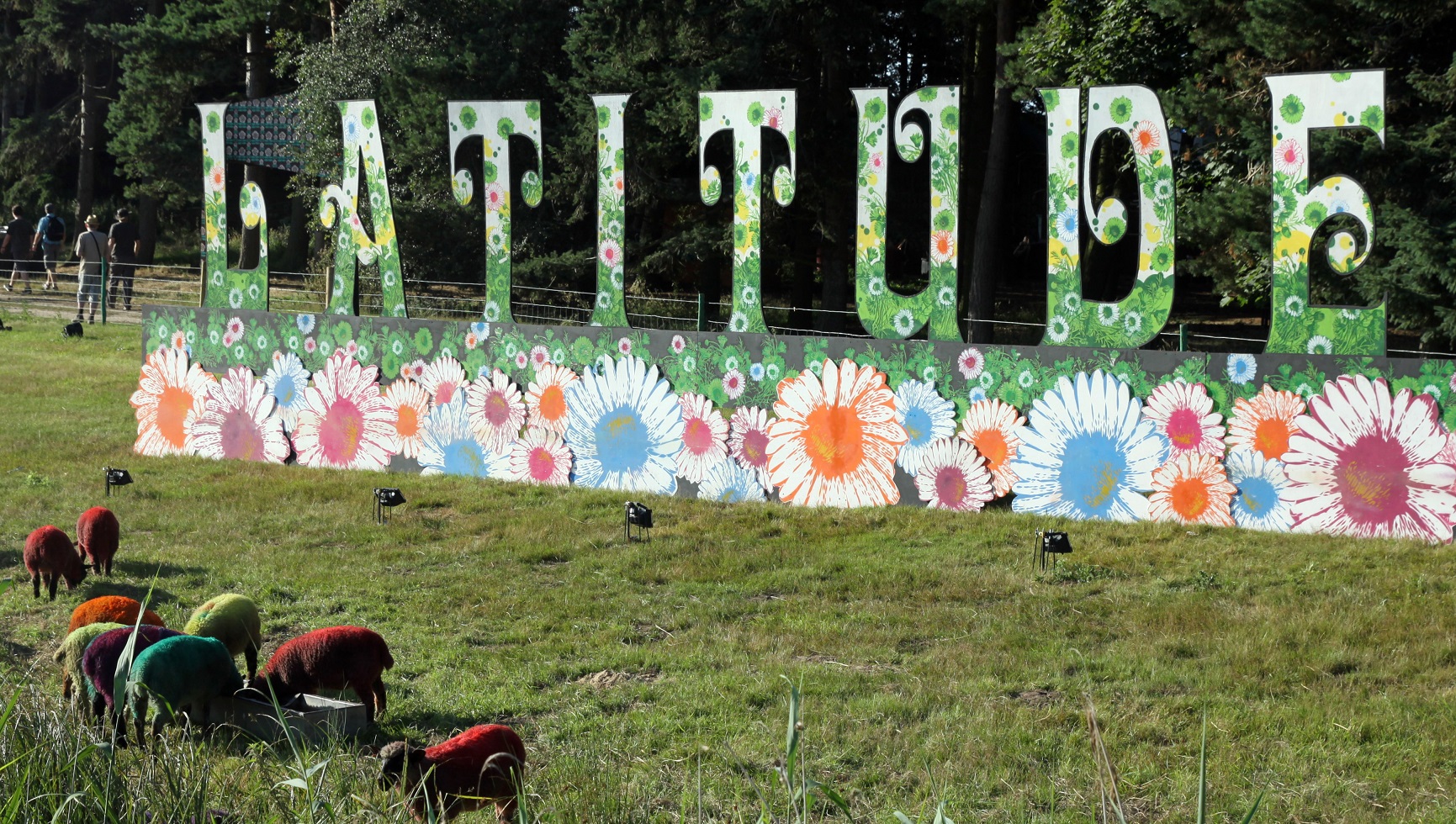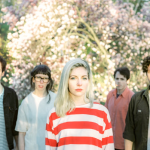Latitude has something for everyone. Returning to the sumptuous surroundings of Henham Park in Suffolk for its ninth annual outing it is a pan-cultural experience. Often compared to Glastonbury for its artistic scope, the Latitude festival offers its 35,000 visitors cabaret, comedy, dance, film, literature, poetry and theatre alongside a wide range of other events that include live art, storytelling and an entire area devoted to children’s activities. And that is before you even get anywhere near to the music.
To view the Latitude experience almost entirely through the prism of music may leave the observer open to accusations of cultural myopia, but even within that particular panorama there is a huge diversity and so much to enjoy.
Thursday evening and the Argentinian dance duo German Cornejo and Gisela Geleassi’s most impressive take on contemporary tango aside, is all about The Irrepressibles. Performing on the Waterfront Stage – located as it is on the small, beautifully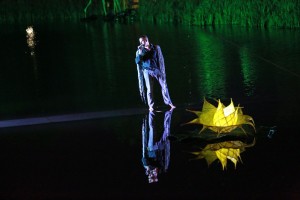 picturesque lake that bisects the festival arena – they draw together so many of Latitude’s cultural strands during what is a mesmerising performance. Strong elements of opera, orchestration, theatre and interpretative dance are all here, as is Jamie Irrepressible’s remarkable inferno of a voice. A febrile mix of Antony Hegarty and Nina Simone it transforms ‘Always On My Mind’ into the towering torch song it probably always was.
picturesque lake that bisects the festival arena – they draw together so many of Latitude’s cultural strands during what is a mesmerising performance. Strong elements of opera, orchestration, theatre and interpretative dance are all here, as is Jamie Irrepressible’s remarkable inferno of a voice. A febrile mix of Antony Hegarty and Nina Simone it transforms ‘Always On My Mind’ into the towering torch song it probably always was.
Ricocheting back and forth between the festival’s two main stages on Friday afternoon proves to be time well spent. American avant-popsters San Fermin capture the early festival mood with their sunny horns and Charlene Kaye’s warm, breathy voice, something that Sheffield’s Slow Club seek to replicate shortly afterwards in the Obelisk Arena. Here Charles Watson and Rebecca Taylor are joined by Guillemots’ Fyfe Dangerfield who adds even greater ballast to their already grand, soulful ambition.
Jimi Goodwin is always good value. Constant touring since the release of his début album Odludek earlier this year has honed his band – including the massively underrated Jake Evans on guitar – into a quite formidable force. ‘Live Like A River’ is full of fire whilst a stirring ‘The Last Broadcast’ reminds us of Goodwin’s earlier life in Doves.
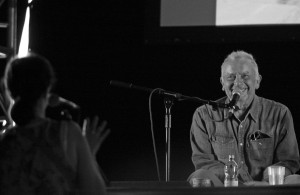 Despite huge waves of soulful R&B from a much rejuvenated Kelis bleeding into the Film & Music tent, it is not difficult to be completely enthralled by David Bailey. The man who more than most captured the Zeitgeist of the swinging sixties through his iconic fashion and portrait photography is in conversation with writer and broadcaster, Tim Marlow. Bailey proves to be as easy an interviewee as he is as modest about his immense talent. Still very much the anti-establishment outsider he prefers to look towards the future rather than through the lens of his illustrious past. An hour most well spent.
Despite huge waves of soulful R&B from a much rejuvenated Kelis bleeding into the Film & Music tent, it is not difficult to be completely enthralled by David Bailey. The man who more than most captured the Zeitgeist of the swinging sixties through his iconic fashion and portrait photography is in conversation with writer and broadcaster, Tim Marlow. Bailey proves to be as easy an interviewee as he is as modest about his immense talent. Still very much the anti-establishment outsider he prefers to look towards the future rather than through the lens of his illustrious past. An hour most well spent.
Goat then pick up the musical threads of the day. A compelling visual presence in which masks, robes and a strong voodoo vibe are key, these Swedish space storm troopers colonise the BBC Radio 6 Music Stage on Friday evening. Theirs is a form of world music which explodes beyond even those loose parameters. It fuses George Clinton and Dr John with early 70’s progressive, psychedelic rock in a hypnotic swirl of rhythm and dance.
Goat may be a tough act to follow but Anna Calvi rises to that challenge. Whereas at Glastonbury a few weeks ago she seemed to struggle with the occasion, here she is truly in her element. Opening with ‘Suzanne & I’ from her eponymous début album and concluding with the perennial cover of Frankie Laine’s ‘Jezebel’ her set burns with passion, urgency and barely controlled sexual aggression.
Over the Sunrise Bridge and out in the woods lies the i Arena. Ryan Lott, the man who is Son 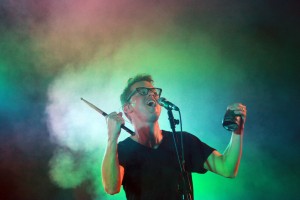 Lux, and his two compadres Rafiq Bhatia on guitar and drummer Ian Chang revel in the natural open space this stage affords. Together they take us on a thrilling switchback ride past the signposts marked opera, progressive rock, synth-pop, baroque-pop, classical and jazz, arriving at their destination with a mesmeric ‘We Lost It To Trying’.
Lux, and his two compadres Rafiq Bhatia on guitar and drummer Ian Chang revel in the natural open space this stage affords. Together they take us on a thrilling switchback ride past the signposts marked opera, progressive rock, synth-pop, baroque-pop, classical and jazz, arriving at their destination with a mesmeric ‘We Lost It To Trying’.
Drafted in at the eleventh hour for the ailing Two Door Cinema Club, Lily Allen proves to be an endearing replacement. Performing behind, between and in front of a phalanx of out-sized babies’ bottles she is quick to impress upon the audience the maturity and responsibility that marriage and motherhood has brought her. Peppered with songs from her latest album Sheezus, but also containing old chestnuts ‘LDN’ (with which she opened), ‘Smile’ and ‘Not Fair’ (with which she closed) her set is an exercise in how to best bring the old music hall sing-a-long traditions to the Instagram generation.
Saturday morning sees the strange sight of Damon Albarn being asked for ID at the entrance 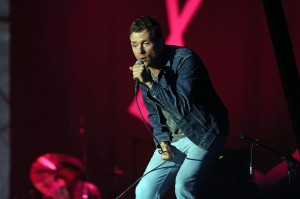 to the Guest Area. Fortunately he eventually gains admittance and some ten hours later proceeds to enthral with his talent, versatility and charm. His headlining set on the main stage is heavily populated by tracks from his début solo album Everyday Robots – despite the vast setting, opening song ‘Lonely Press Play’ loses none of its lovely intimacy; the string section bring out the finer details of the record’s title track; and work to similar magical effect on the delicate introspection of ‘Hostiles’ – and his work with Gorillaz. There is also time and space for a couple of The Good, the Bad & the Queen songs – ‘Three Changes’ and ‘Kingdom of Doom’ – further illustrating what a remarkable songwriter the man is.
to the Guest Area. Fortunately he eventually gains admittance and some ten hours later proceeds to enthral with his talent, versatility and charm. His headlining set on the main stage is heavily populated by tracks from his début solo album Everyday Robots – despite the vast setting, opening song ‘Lonely Press Play’ loses none of its lovely intimacy; the string section bring out the finer details of the record’s title track; and work to similar magical effect on the delicate introspection of ‘Hostiles’ – and his work with Gorillaz. There is also time and space for a couple of The Good, the Bad & the Queen songs – ‘Three Changes’ and ‘Kingdom of Doom’ – further illustrating what a remarkable songwriter the man is.
Following a solo version of ‘End of Century’ and as if right on cue thunder and lightning then fill the Suffolk sky before Albarn introduces Graham Coxon the man with whom he wrote another Blur song, ‘Tender’. Together they harness all the yearning, hurt and chaos that surrounded the album 13 from which the song is taken.
Damon Albarn closes Saturday night in triumph but there has been much to delight earlier on in the day. Cass McCombs, a man for whom everything in life seems gradual, eases his unhurried way through an early afternoon set of serenity and country-tinged Americana. The flip-side of that particular rootsy coin may well have the head of Conor Oberst impressed upon it. The Bright Eyes frontman brings a more frayed level of self-absorption to the table, manifesting itself in a set which is replete with natural energy and rich determination.
After Booker T. Jones‘ relaxed stroll through the great American blues and soul songbook, The Afghan Whigs are an unusual counterpoint. Mid-afternoon in an open field is perhaps not the best time or place in which to experience their dark, menacing take on rock n roll revenge. Yet Greg Dulli is not one for compromise and he makes a great threatening fist of it all.
Former Mercury prize nominee Ghostpoet grows in stature and confidence with each passing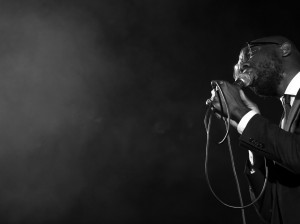 year. He patrols an area bordering Roots Manuva and Tricky and is undoubtedly the sharpest dressed man of the entire weekend. Yet for sheer exultation, the most uplifting, exuberant performance of the day has to be that of Daryl Hall & John Oates. Rightly derided by many in the ‘80s as cartoon caricatures of pop stars, the Philadelphians’ deep imprint upon classic white soul is often overlooked. They opt here for a set laden down with hit after superb hit – ‘Family Man’, ‘She’s Gone’, ‘Rich Girl’ and a funky, elongated reincarnation of ‘I Can’t Go For That (No Can Do)’ – and seem genuinely moved by the extended standing ovation rightly afforded them by a packed BBC 6 Radio Music marquee tent.
year. He patrols an area bordering Roots Manuva and Tricky and is undoubtedly the sharpest dressed man of the entire weekend. Yet for sheer exultation, the most uplifting, exuberant performance of the day has to be that of Daryl Hall & John Oates. Rightly derided by many in the ‘80s as cartoon caricatures of pop stars, the Philadelphians’ deep imprint upon classic white soul is often overlooked. They opt here for a set laden down with hit after superb hit – ‘Family Man’, ‘She’s Gone’, ‘Rich Girl’ and a funky, elongated reincarnation of ‘I Can’t Go For That (No Can Do)’ – and seem genuinely moved by the extended standing ovation rightly afforded them by a packed BBC 6 Radio Music marquee tent.
Under sullen skies, Sunday does have its share of disappointments. There can be no doubting the Brooklyn trio Augustines’ raw emotional energy and ability to generate a massive, unified fist-pumping reaction from their audience with their huge anthemic sound, yet the absence of any real nuance to their songs leaves them trailing in the wake of much more inspired blue-collar rock. The Jayhawks pleasant but largely ineffectual country-rock does not linger long in the memory and Tame Impala struggle to impress the true transcendental spirit of their warped, psychedelic melodies in this setting. And quite why Chrissie Hynde chooses to haul some half-stoned man out of the crowd and onto the stage for the duration of her set is unfathomable. His Iggy-inspired dance moves add nothing whatsoever to the show but even they cannot detract from the majesty of Hynde’s voice as she drives her band through a wonderful ‘Brass In Pocket’.
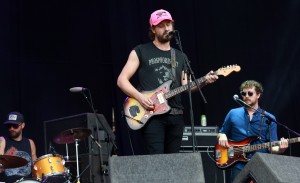 With a quite glorious mid-afternoon set, Matthew Houck boldly reaffirms the fact that he is in a much better place today when compared with the ramshackle, untethered nature of his life a couple of years back. The heartbreak and dissolution can still be heard in his cracked voice but with a reassuringly impressive Phosphorescent alongside him you sense he is capable of most anything. Today he just confines himself to richly textured, beautifully crafted compositions inspired by life and living.
With a quite glorious mid-afternoon set, Matthew Houck boldly reaffirms the fact that he is in a much better place today when compared with the ramshackle, untethered nature of his life a couple of years back. The heartbreak and dissolution can still be heard in his cracked voice but with a reassuringly impressive Phosphorescent alongside him you sense he is capable of most anything. Today he just confines himself to richly textured, beautifully crafted compositions inspired by life and living.
A man who has also known hard times but seems to have come through the other side of depression and paranoia is Adam Granduciel. With The War on Drugs he throws himself into an intense therapeutic convulsion of psychedelia and country rock and for an hour or so they just never ease up. It is an occasionally unrelenting but always inspirational sound that moves the afternoon from languor into life-affirmation in one simple step.
Parquet Courts add haste and incisive New York attitude. But for pure captivation, rolled out in the most pliant, resilient form you could ever care to imagine, look no further than those magnificent Baltimore electro-synthpoppers Future Islands. For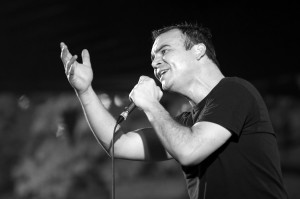 them there is no first, second or third gear as they hit the ground running with ‘Back In The Tall Grass’ and from there on in never take their foot off the gas. In Samuel T Herring they have a man about whom Mark E Smith must surely have written Elastic Man as he constantly slides, contorts and gyrates across every single inch of the small stage. It is impossible to take your eyes off him; an uninhibited Henry Rollins meets John Travolta in Grease disco-marionette, he is also blessed with the most heartfelt and dramatic of soulful voices.
them there is no first, second or third gear as they hit the ground running with ‘Back In The Tall Grass’ and from there on in never take their foot off the gas. In Samuel T Herring they have a man about whom Mark E Smith must surely have written Elastic Man as he constantly slides, contorts and gyrates across every single inch of the small stage. It is impossible to take your eyes off him; an uninhibited Henry Rollins meets John Travolta in Grease disco-marionette, he is also blessed with the most heartfelt and dramatic of soulful voices.
And so the ninth edition of the Latitude Festival finally draws to a close. Blessed with the most glorious of locations, this natural beauty is matched by the event’s detailed planning, organisation and execution. These features translate right across the musical board with a bill that balances popular appeal with far more esoteric, leftfield talent, something that will surely ensure Latitude’s continuing success for many years to come.
More photos from the festival can be found HERE

